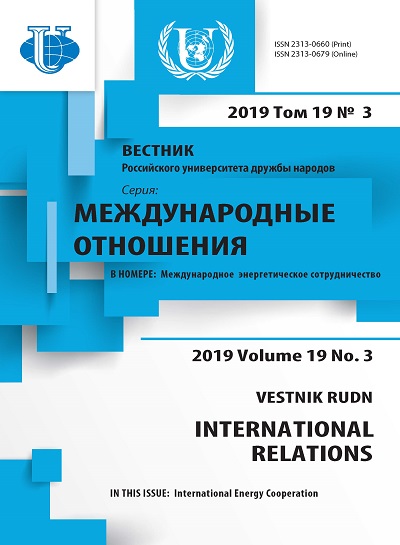The Kurdish Issue in Turkish-Syrian Relations in the Context of the Syrian Crisis
- Authors: Gevorgyan A.G.1
-
Affiliations:
- RUDN University
- Issue: Vol 19, No 4 (2019): Islamic Factor in World Politics
- Pages: 615-624
- Section: THEMATIC DOSSIER
- URL: https://journals.rudn.ru/international-relations/article/view/22840
- DOI: https://doi.org/10.22363/2313-0660-2019-19-4-615-624
Cite item
Full Text
Abstract
The article is devoted to the Kurdish issue in the context of bilateral relations between Turkey and Syria after the start of the 2011 Syrian crisis. Particular attention is paid to the role of the Kurdish issue in the Turkish-Syrian relations. The author describes the Turkish policy on the Kurdish problem and its place in the context of Turkey’s national interests. The article covers gradual development of the Syrian-Kurdish policy of Turkey and dynamics of relations between Ankara and Damascus in the context of strengthening the Kurdish national movement in Syria. The activities of the Kurdish political parties and organizations in the northern and northeastern part and the development perspective of the Kurdish issue are especially analyzed. Turkey’s relations with Syria, Iran, Iraq, where Kurds live, have always been based on the Kurdish issue. Contrary to the differences and conflicts between Kurdish parties in the Middle East, the Kurdish issue is regional in nature. In addition to being a domestic political problem, Turkey considers the Kurdish issue as a foreign policy problem. Turkey presents its fight against the Kurdish PKK forces as a fight against terrorist forces, seeing the intensification of political and military activities of the Syrian Kurds as a direct threat to its national security. Over the past years, Turkish-Syrian relations have substantially changed and transformed from strategic partnership to militarypolitical confrontation. Despite the existing contradictions, Turkey and Syria have common interests, including the Kurdish issue, the stability of the region, the predictability of the development of political events in the Middle East region, and economic relations. However, regardless of the outcome of the Syrian war, Turkey needs a predictable Syria without a strong Kurdish element. The Syrian crisis has given new opportunities to the Kurds of Syria in terms of strengthening their positions, but clearly demonstrated the problems existing in the way of creating a Kurdish state. Currently, the preservation of the territorial integrity of Syria allows taking into account the interests of all parties involved in the conflict, including external players.
Keywords
About the authors
Anna Garnukovna Gevorgyan
RUDN University
Author for correspondence.
Email: gevorgyan-ag@rudn.ru
Assistant, the Department of Theory and History of International Relations
Moscow, Russian FederationReferences
- Avatkov, V.A. (2012). Kurdish Issue on Turkish Field. Vestnik MGIMO-University. Political Science, 23 (2), 128—133. (In Russian).
- Avatkov, V.A. (2012). Turkish—Syrian Conflict Interaction in a Global Context: from 2011 to 2012. The Contemporary Middle East — a Conflict Zone: Whole Edition of Scientific Articles. Moscow: MGIMO MID Rossii publ. (in Russian).
- Bagdasarov, S.A. (2016). Near East. Reboot. Moscow: Izdatelstvo E publ. (In Russian).
- Bayburdyan, V․ (2017). K’rdakan harts’i nerka vichaky yev zargats’man mitumnery [The Current State and Prospects for Development of the Kurdish Issue]. Banber Yerevani hamalsarani. Mijazgayin haraberut’yunner, K’aghak’agitut’yun [Vestnik YSU.Politics], 2 (23), 3—18. (In Armenian).
- Bishku, M.B. (2012). Turkish—Syrian Relations: A Checkered History. Middle East Policy, 19 (3), 36—53. doi: 10.1111/j.1475-4967.2012.00546.x
- D’Alema, F. (2017). The Evolution of Turkey’s Syria Policy. IAI Working Papers.
- Davutoğlu, A. (2011). Stratejik Derinlik. Türkiye’nin Uluslararası Konumu. Istanbul. (In Turkish).
- Dyurre, M. (2017). Self-Determination of the Kurds in Syria: Origins, Forms and International Prospects. MGIMO Review of International Relations, 55 (4), 183—193. doi: 10.24833/2071-8160-2017-4-55-183-193 (In Russian).
- Gunes, C. & Lowe, R. (2015). The Impact of the Syrian War on Kurdish Politics Across the Middle East. Chatham House, the Royal Institute of International Affairs. URL: https://syria.chathamhouse.org/assets/documents/ 20150723SyriaKurdsGunesLowe.pdf (accessed: 17.09.2018).
- Halhalli, B. (2018). Kurdish Political Parties in Syria: Past Struggles and Future Expectations. In: Tugdar, E. & Al, S. (Eds.).
- Comparative Kurdish Politics in the Middle East. Springer International Publishing. P. 27—53. doi: 10.1007/9783-319-53715-3
- Hinnebusch, R. (2015). Back to Enmity: Turkey — Syria Relations since the Syrian Uprising. Orient, Journal of German Orient Institute, 56 (1), 14—22.
- Olson, R. (1997). Turkey — Syria Relations since the Gulf War: Kurds and Water. Middle East Policy, 5 (2), 168—193. doi: 10.1111/j.1475-4967.1997.tb00272.x
- Öniş, Z. (2014). Turkey and the Arab Revolutions: Boundaries of Regional Power Influence in a Turbulent Middle East.
- Journal Mediterranean Politics, 19 (2), 203—219. doi: 10.1080/13629395.2013.868392
- Phillips, D.L. (2015). The Kurdish Spring. A New Map of the Middle East. New Brunswick, New Jersey.
- Radpey, L. (2015). The Kurdish Self-Rule Constitution in Syria. Chinese Journal of International Law, 14 (4), 835—841. doi: 10.1093/chinesejil/jmv057
- Radpey, L. (2016). Kurdish Regional Self-rule Administration in Syria: A New Model of Statehood and Its Status in International Law Compared to the Kurdistan Regional Government (KRG) in Iraq. Japanese Journal of Political Science, 17 (3), 468—488. doi: 10.1017/S1468109916000190
- Shoresh, A. (2017). The Syrian Crisis and the Kurdish Factor. Svobodnaya mysl’, 6, 165—174. (In Russian).
- Stansfield, G. &Shareef, M. (2017). The Kurdish Question Revisited. Oxford University Press.
- Suleymanov, A.V. (2015). Turkish—Syrian Relations: Yesterday and Today. Asia and Africa Today, 12 (701), 32—38. (In Russian).
- Taşpınar, Ö. (2012). Turkey’s Strategic Vision and Syria. The Washington Quarterly, 35 (3), 127—140. doi: 10.1080/0163660X.2012.706519
- Vertyaev, K.V., Zhigalina, O.I. & Ivanov, S.M. (2013). Political Processes in the Kurdish Areas of Western Asia (Iraq, Turkey, Syria, Iran). Moscow: Institute of Oriental Studies, RAS publ. (In Russian).











